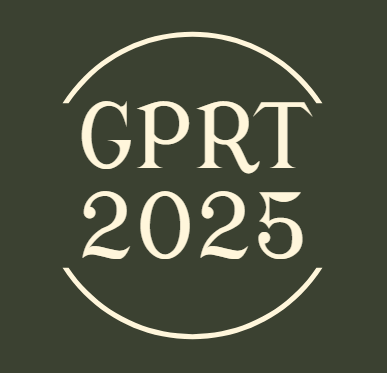THE GOVERNMENT PHONOLOGY ROUND TABLE (GPRT) IS THE SEMI-INFORMAL MEETING OF ALL THE GP-ISTS OF THE WORLD (AND THEIR FRIENDS :) ). More info at the GPRT website >> Wikipedia on Government Phonology >>
 GPRT 2025 - Catholic University in Ružomberok, Slovakia
GPRT 2025 - Catholic University in Ružomberok, Slovakia
19-20 June 2025
Programme (as of 15 June 2025)
Pre-conference social programme: Wed 18 June
Afternoon (from cca. 2.30pm): Discovery walk from Blesk to the uni
and getting around - Meeting in the foyer buffet of Pedagogická fakulta
Evening (from 6pm): Dinner at Café Efekt (see the black star on our map)
Venue: Rm 010 (talks) and Rm 007 (coffee breaks/buffet) in the building of the Faculty of Humanities (Filozofická fakulta) - check out the photographically illustrated guide at Venue info
Thur 19 June
| 8:45 | Opening: Dr. Markéta Rusnáková, Vice-Rector of the Catholic University in Ružomberok, and Dr. Samuel Štefan Mahút, Dean of the Faculty of Humanities |
| 9:00-9:30 | Markus Pöchtrager (Vienna, Austria): Neutralisation as integration: The case of Korean |
| 9:30-10:00 | Kuniya Nasukawa, Hitomi Onuma & Masatoshi Koizumi (Sendai, Japan): The phonological status of schwa in the vocalic system of Truku |
| 10:00-10:30 | László Kristó (Eger, Hungary): Welsh vowel length and the North-South Divide: The case of the (in)famous lateral fricative |
Coffee break
| 11:00-11:30 | John R. Rennison (Vienna, Austria): Principles vs. magic in Koromfe suffixes |
| 11:30-12:00 | Krisztina Polgárdi (Budapest, Hungary): The beginning of the word and the direction of proper government |
| 12:00-12:30 | Florian Breit (Freiburg, Germany): “How many licensing constraints are there?” and other open questions in formal Element Theory |
Lunch break
| 13:30-14:00 | Anna Poĺomská (Brno, Czechia): Deriving Czech palatalization in a recursive model of phonology |
| 14:00-14:30 | Edoardo Cavirani & Guido Vanden Wyngaerd (Leuven, Belgium): A representational analysis of Czech palatalization |
| 14:30-15:00 | Sławomir Zdziebko (Lublin, Poland): Schrödinger's (Affri)cate Palatalization: An autosegmental account of lexical exceptionality |
Coffee break
| 15:30-16:00 | Edoardo Cavirani (Leuven, Belgium) & Ora Matushansky (Paris, France & Utrecht, Netherlands): The morphophonology of Russian declensions |
| 16:00-16:30 | Nicola Lampitelli (Paris, France) & Marko Simonović (Graz, Austria): Balancing the wobbly a in BCMS: The role of epenthesis, infixation, and inhibited slots |
"Sightseeing" walk to the city centre + dinner at Laverna (19:00-)
Fri 20 June
| 9:30-10:00 | Lawrence Sandow (Szeged, Hungary): Vowel harmony in Kusaal: An Element Theory analysis |
| 10:00-10:30 | Isaac Nyarko (Budapest, Hungary): On the phonology of circumfixation in Akan |
| 10:30-11:00 | Nancy Chongo Kula (Leiden, Netherlands): Representing tone--segment interaction |
Coffee break
| 11:30-12:00 | Diana Passino (Nice, France): On stress and templates in Italo-Romance |
| 12:00-12:30 | Sofia Alexei (Vienna, Austria): On diphthongs and metaphony in Romanian |
| 12:30-13:00 | Bálint Huszthy (Budapest, Hungary): Despite its weirdnesses, Italian is still a well-behaved voice language after all |
Lunch break
| 14:00-15:00 | Plenary: Jean Lowenstamm (Paris, France): On the empirical content of some tenets of Distributed Morphology |
Brief breather :)
| 15:10-15:40 | Friedrich Neubarth (Vienna, Austria): A brief (re-)contemplation of element theories in GP |
| 15:40-16:10 | Péter Őri (Budapest, Hungary): What do dissimilatory patterns suggest about laryngeal markedness? |
Coffee break
| 16:30-17:00 | Artur Kijak (Katowice, Poland): On the status of C+yod clusters in Present-day English |
| 17:00-17:30 | Katalin Balogné Bérces (Ružomberok, Slovakia & Budapest, Hungary): Some rules R natural, some R a little crazy |
Dinner at California Pub (18:30-)
Other confirmed participants:
- Eugeniusz Cyran (Lublin, Poland)
- Péter Szigetvári (Budapest, Hungary)
- Christian Huber (Vienna, Austria)
- Erika Sajtós (Budapest, Hungary)
- Csaba Csides (Budapest, Hungary)
Supported by The Van Riemsdijk Foundation. 
Local organisers: Katalin Balogné Bérces (KU Ružomberok & PPCU Budapest) & Jela Kehoe (Head of Dept. of English Language and Literature, KU Ružomberok). Special thanks to Samuel Štefan Mahút, Dean of the Faculty of Humanities; Shanti Ulfsbjorninn; Viktor Varga and the admin team of KU; Katarína Labudová; the laryng research group, esp. Péter Szigetvári, and the admin team of ELTE Budapest; Markus Pöchtrager and Sofia Alexei; John and Emma Kehoe; and to everyone willing to share a room :) We kindly acknowledge the financial support of KAJL FF KU.




